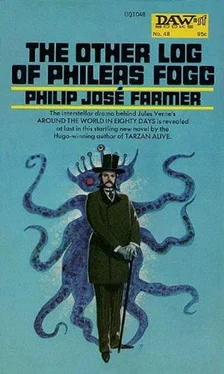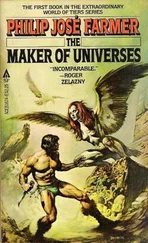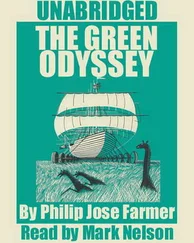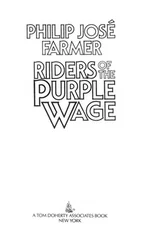Philip Farmer - The Other Log of Phileas Fogg
Здесь есть возможность читать онлайн «Philip Farmer - The Other Log of Phileas Fogg» весь текст электронной книги совершенно бесплатно (целиком полную версию без сокращений). В некоторых случаях можно слушать аудио, скачать через торрент в формате fb2 и присутствует краткое содержание. Жанр: Фантастика и фэнтези, на английском языке. Описание произведения, (предисловие) а так же отзывы посетителей доступны на портале библиотеки ЛибКат.
- Название:The Other Log of Phileas Fogg
- Автор:
- Жанр:
- Год:неизвестен
- ISBN:нет данных
- Рейтинг книги:3 / 5. Голосов: 1
-
Избранное:Добавить в избранное
- Отзывы:
-
Ваша оценка:
- 60
- 1
- 2
- 3
- 4
- 5
The Other Log of Phileas Fogg: краткое содержание, описание и аннотация
Предлагаем к чтению аннотацию, описание, краткое содержание или предисловие (зависит от того, что написал сам автор книги «The Other Log of Phileas Fogg»). Если вы не нашли необходимую информацию о книге — напишите в комментариях, мы постараемся отыскать её.
The Other Log of Phileas Fogg — читать онлайн бесплатно полную книгу (весь текст) целиком
Ниже представлен текст книги, разбитый по страницам. Система сохранения места последней прочитанной страницы, позволяет с удобством читать онлайн бесплатно книгу «The Other Log of Phileas Fogg», без необходимости каждый раз заново искать на чём Вы остановились. Поставьте закладку, и сможете в любой момент перейти на страницу, на которой закончили чтение.
Интервал:
Закладка:
Stuart said, “But do you have a description?”
Ralph said, “In the first place, he is no robber.”
Stuart was astounded. “What! A chap who makes off with fifty-five thousand pounds is no robber?”
“No.”
“Perhaps, then, he is a manufacturer?”
“ The Daily Telegraph reports that he is a gentleman.”
No one smiled at this last remark, which was made by Phileas Fogg. He rose, bowed to his whist partners, and indulged in a conversation about the robbery. Three days before, a package of bank notes had been picked up by a gentleman from the principal cashier’s table. It was not the gentleman’s, but he did not return it. So, in a sense, it was his. At least, it would be until he was caught.
As Verne observes, “The Bank of England has a touching confidence in the honesty of the public.” No one even knew that the fifty-five thousand pounds were missing until the bank was closed and the books were balanced. No guards stood by, ready to defend the institution from illegal activities. The cashier had noticed the man taking the money but had thought nothing of it until the loss was discovered.
However, the Bank of England quickly took action when it found its confidence, not to mention the money, misplaced. Detectives were hurried off to Liverpool, Glasgow, Le Havre, Suez, Brindisi, New York, and other parts. The natural zeal of the manhunters was sharpened by a reward of two thousand pounds plus five percent on the recovered sum. They were not proceeding blindly, since they had been provided with an excellent description of the gentleman who had taken the money.
Ralph, as a bank official, thought it unthinkable that the man would not soon be caught. Stuart, the engineer, disputed his conclusion, even after the whist game had started. He had for partner Mr. Flanagan, while Fogg’s was Fallentin. Of course, they did not converse until after the first rubber was over. Stuart then said, “I maintain that chance favors the thief, who has to be a shrewd chap.”
Ralph said, “But where can he fly to? No country is safe for him.”
Stuart exclaimed with disbelief.
“Where would he go?” Ralph said.
Stuart snorted and said, “I don’t know. The world is big enough.”
And having provided an opening for Fogg, he waited.
Stuart is derived from “steward,” one who manages. And Stuart was an engineer in both a public and a private sense. He was, in fact, Fogg’s superior, for all Fogg knew, the head of the entire Eridanean Race. He was the steward, and he was chief engineer of the Race, natal and adopted.
“The world is big enough,” Stuart repeated.
Fogg said in a low voice, “It once was.”
He handed the reshuffled cards to Flanagan.
“Cut, sir.”
After the rubber, Stuart said, “What does your ‘once’ mean? Has the world grown smaller?”
Ralph said, “Indeed, I agree with Mr. Fogg. The world has grown somewhat smaller. A man can now go around it ten times more quickly than he could a hundred years ago. That is why the search for the thief is more likely to succeed.”
Stuart said, “But that is also why it is easier for the thief to get away.”
“Be so good as to play, Mr. Stuart,” Fogg said.
No one except Stuart was aware of the double meaning in this request.
Stuart was, it must be confessed, as keen a cardsharper as could be found. Even if he had had no native talent, he would have had to be dull indeed not to have profited by one hundred and fifty years of practice. Despite his ability to crook the cards, he was always honest. That is, he was unless the occasion required otherwise. In this case, the occasion required. And so Stuart laid down as his first card that which he had selected, the jack of diamonds. To all except Stuart and Fogg, it meant that diamonds would be trumps. To Fogg it was an order to bet, to take a dare, though not with the cards. What bet, what dare? That depended on Stuart’s conversation and Fogg’s ability to interpret.
When this rubber was over, Stuart said, “You have a strange way, Ralph, of proving that the world has gotten smaller. Thus, because you can go around it in three months…”
“Eighty days,” Fogg said.
Sullivan interrupted with a long explanation of why it would only take eighty days. The Great Indian Peninsula Railway had just opened a new section between Rothal and Allahabad, and this would reduce the traveling time enough to make it possible. The Daily Telegraph itself had made out a schedule whereby an intrepid, and lucky, traveler might proceed from London and circle the globe with enough speed to be back in London in eleven weeks and three days.
Stuart became so excited at this that he made a false deal. At least, he seemed to be excited. Fogg knew that the trey of diamonds meant: On the track. Go ahead.
Stuart then said that the schedule did not take into account bad weather, contrary winds, shipwrecks, railroad accidents, and other likely events.
“All included,” Fogg said. He had kept on playing even though the others had stopped.
Stuart was insistent. “Suppose the Hindus or American Indians pull up the rails? Suppose they stop the trains, clean out the baggage cars, scalp the passengers?”
“All included,” Fogg replied calmly. He threw down his cards. “Two trumps.”
The others looked surprised, not at his cards but at his talkativeness. And they found his attitude irritating. The mirror-smooth calmness and assumption of authority had been noticed by them before, but in general he was a decent chap. His peccadilloes were minor and forgivable because he was an eccentric. Englishmen then loved eccentrics, or at least respected them. But the world was much bigger then and there was room for the unconventionals.
It was Stuart’s turn to deal. While shuffling, he said, “Theoretically, you’re right, Mr. Fogg. But practically…”
“Practically also, Mr. Stuart.”
Mr. Stuart had hoped that someone besides himself would initiate the bet. Since this did not now seem likely, he would have to do it. He hoped that the inevitable Capellean-who was he? The servant nearby? Fallentin? Flanagan? Perhaps, perish the thought, Fogg himself?-would think that the bet had arisen naturally. Of course, they were on to Fogg now or at least suspected him. But he did not want them to suspect Stuart. Or, at least, to suspect no more than they did Fallentin, Flanagan, or Ralph.
In a somewhat indignant manner, he said, “I’d like to see you do it within eighty days.
“That,” Fogg said, “depends on you. Shall we go?”
Stuart replied that he would bet four thousand dollars that it could not be done.
Fogg calmly insisted that it was quite possible. One thing led to another, and so the famous wager was made. Fogg had a deposit of twenty thousand pounds at Baring’s. He would risk all of it.
Sullivan cried out, and we may judge the intensity of his passions-real or assumed-by the fact that an English gentleman would raise his voice inside the Reform Club. He cried out that Fogg would lose all by one accidental delay.
Phileas Fogg replied with his curious, and now classical, remark that the unforeseen does not exist.
Stuart may have shot a warning look. Any eavesdropping Capellean would fasten onto this, worry it as if he were a dog and it the bone, and find in the marrow a vast suspicion. He would wonder if some strange hands were being dealt by strange hands at this card table.
Or had Stuart sent the message that Fogg was to talk suspiciously?
The latter seems more likely, since Stuart’s plan was to use Fogg as a decoy. The time for laying low was over. Now there was a reason for bringing the enemy out, to mark them, and to put an end to them.
Where Stuart got his idea for exposing Fogg is not known. At least, the other log says nothing about its origin. Probably, Stuart was inspired when he read the model schedule for the eighty-day trip in The Daily Telegraph. Fogg would not find out until later why Stuart had decided to launch another campaign.
Читать дальшеИнтервал:
Закладка:
Похожие книги на «The Other Log of Phileas Fogg»
Представляем Вашему вниманию похожие книги на «The Other Log of Phileas Fogg» списком для выбора. Мы отобрали схожую по названию и смыслу литературу в надежде предоставить читателям больше вариантов отыскать новые, интересные, ещё непрочитанные произведения.
Обсуждение, отзывы о книге «The Other Log of Phileas Fogg» и просто собственные мнения читателей. Оставьте ваши комментарии, напишите, что Вы думаете о произведении, его смысле или главных героях. Укажите что конкретно понравилось, а что нет, и почему Вы так считаете.












